Understanding the Interactions and Risks
The interaction between melatonin supplements and alcohol consumption is a significant concern for sleep health, safety, and overall wellbeing. While melatonin is widely used to regulate sleep cycles, alcohol — despite its initial sedative effects — often disrupts sleep architecture and can negate melatonin’s benefits. This article explores how alcohol affects melatonin production and effectiveness, potential health risks of mixing these substances, and pragmatic safety guidelines to minimize adverse outcomes.
How Long Should I Wait to Take Melatonin After Drinking Alcohol?
Waiting period after alcohol consumption before taking melatonin
Experts advise against drinking alcohol while using melatonin supplements because of the potential for adverse effects. Alcohol can disrupt sleep patterns, reduce melatonin production naturally, and intensify the sedative effects when combined. To minimize risks, it is recommended to wait at least 2 to 3 hours after consuming alcohol before taking melatonin.
The waiting time depends on the amount of alcohol consumed. For moderate drinking, a 2-3 hour delay is generally sufficient. However, in cases of heavy or binge drinking, waiting could extend up to 24 hours. This allows the body enough time to process alcohol, reducing the chance of deep sleep, breathing issues, and impaired cognition.
Risks of taking melatonin too soon after drinking
Taking melatonin shortly after alcohol intake can lead to excessive drowsiness, difficulty waking up, and impaired coordination. Since both substances are sedatives, their combined use may amplify these effects, increasing the risk of falls, accidents, or overdose. Serious health issues such as abnormal heartbeat, difficulty breathing, or passing out can occur, especially if alcohol intake was heavy.
Additionally, alcohol and melatonin together can cause other problems like flushing, swelling, and increased anxiety. There have been rare cases of symptoms such as rapid heartbeat, dizziness, hallucinations, and weakness from combining these substances. Furthermore, alcohol’s effect on sleep quality worsens with its interaction with melatonin, making restful sleep harder to achieve.
Guidelines for safe timing of melatonin intake post-alcohol
To ensure safety, it is best to avoid mixing alcohol with melatonin altogether. If alcohol has been consumed, wait at least 2-3 hours before taking melatonin. People with existing health conditions, older adults, and those with sleep disorders like sleep apnea should be especially cautious.
For sleep management, keep alcohol intake limited—ideally no more than one drink—and avoid drinking within four hours of planned melatonin use. Always consult a healthcare professional if unsure about timing or if side effects such as dizziness, headache, or difficulty breathing occur.
In summary, patience is crucial when timing melatonin intake after alcohol consumption. Adequate waiting helps prevent serious health complications and supports safer, more effective sleep.
Effects of Alcohol on Melatonin and Sleep Regulation
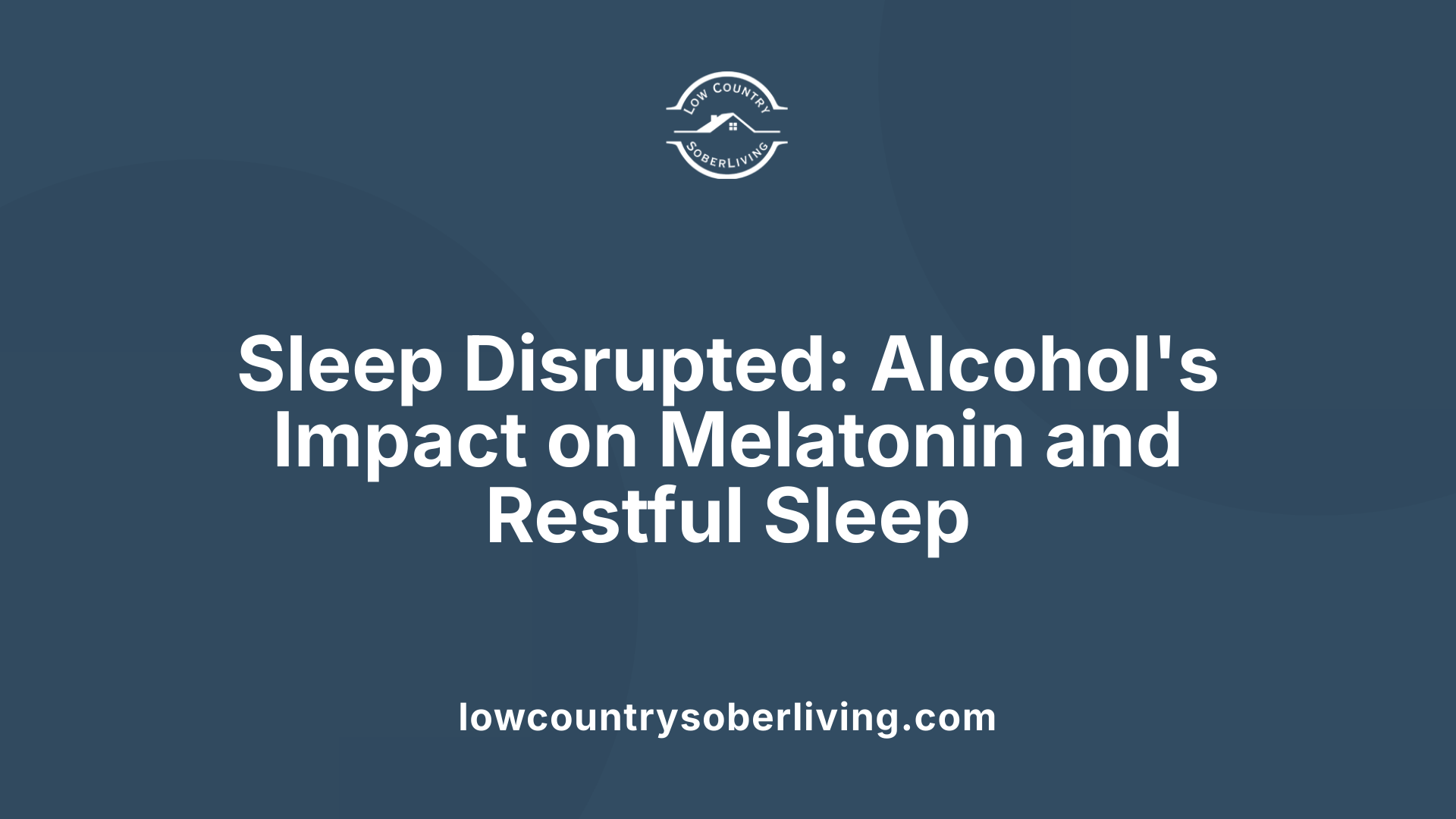
How does alcohol affect melatonin and sleep regulation?
Alcohol has a significant impact on how the body manages sleep and melatonin, the hormone responsible for regulating sleep-wake cycles. When consumed, alcohol reduces the brain's natural melatonin production, disrupting the circadian rhythm and making it harder to fall asleep or sustain restful sleep.
As a central nervous system depressant, alcohol slows down brain activity, which initially may induce sleepiness. However, it often leads to fragmented sleep, shorter sleep duration, and a reduction in restorative deep sleep stages. People may wake up feeling unrefreshed and experience more sleep disturbances, including increased snoring and breathing irregularities, especially in those with sleep disorders like sleep apnea.
Mixing melatonin supplements with alcohol is strongly discouraged by health experts. This combination can cause serious side effects, such as dizziness, heightened anxiety, faulty thinking, and excessive drowsiness. It can also exacerbate breathing problems during sleep, posing risks for individuals with conditions like sleep apnea.
Moreover, alcohol interferes with melatonin metabolism, reducing its effectiveness and potentially leading to unpredictable effects on sleep regulation. It can also diminish the natural levels of melatonin in the body, further impairing sleep quality.
In summary, alcohol not only worsens sleep by disrupting normal sleep cycles but also hampers the body's ability to produce and utilize melatonin effectively. For those seeking better sleep through melatonin supplementation, abstaining from alcohol is highly advised to ensure safety and optimize sleep benefits.
Safety and Risks of Combining Melatonin with Alcohol
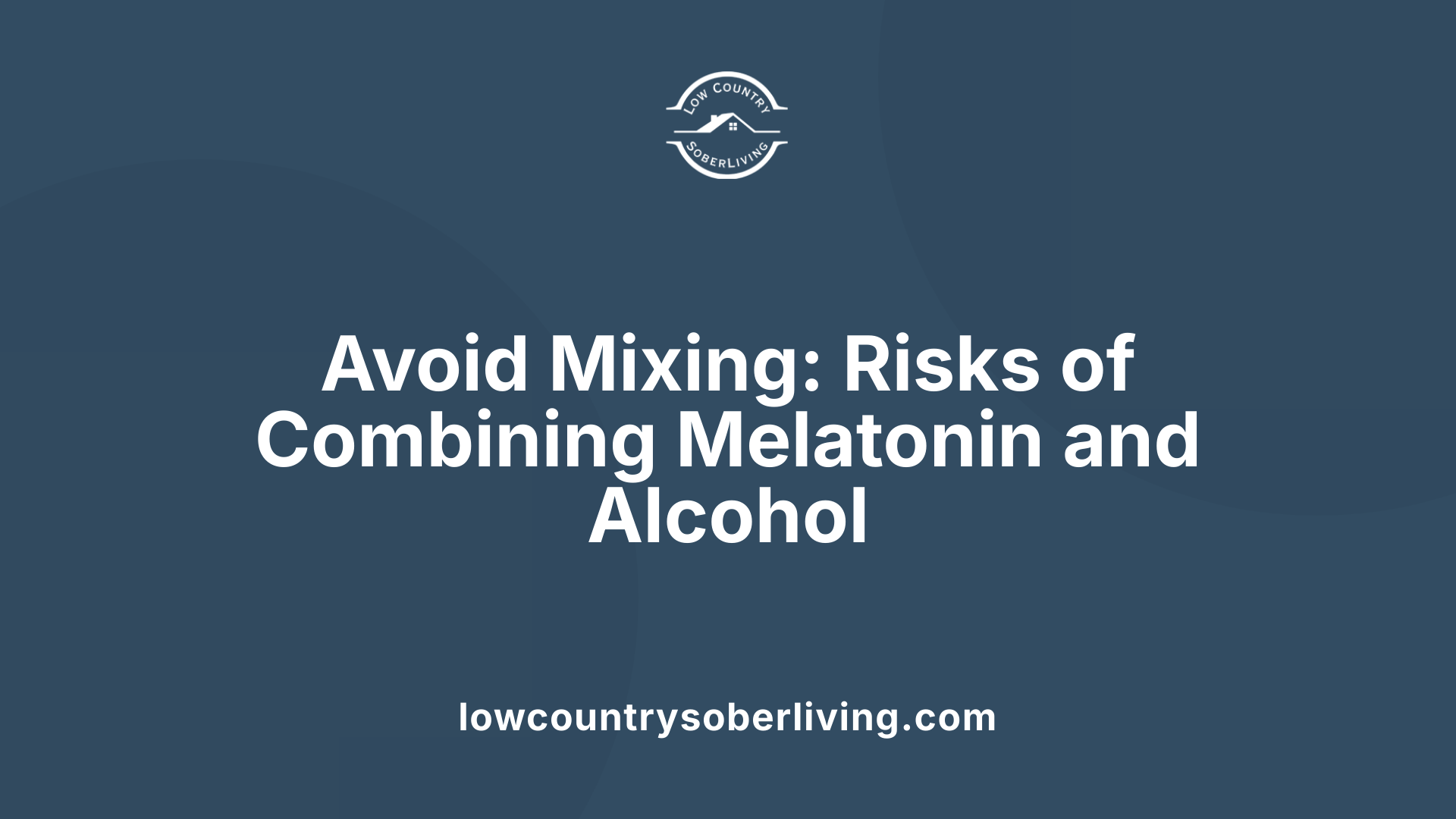
What are the potential health risks of combining melatonin with alcohol?
Mixing melatonin supplements with alcohol can lead to multiple health hazards. Both substances are sedatives that depress the central nervous system, which can amplify effects such as dizziness, excessive drowsiness, and impaired judgment. This increases the risk of accidents, falls, and injuries, especially in vulnerable populations like older adults.
Additionally, combining these substances can cause serious cardiovascular reactions. Some individuals may experience symptoms like a rapid heartbeat, facial flushing, swelling of the feet and hands, and trouble focusing. In some cases, people may encounter signs of difficulty breathing, fainting, or dizziness, which require immediate medical attention.
Liver function is also affected, as alcohol impacts the enzymes that process both alcohol and melatonin. This interaction can slow down metabolization, leading to prolonged side effects and an increased risk of liver strain.
Furthermore, alcohol reduces the body’s natural melatonin production, disrupting sleep cycles. This interference can render melatonin supplements less effective and worsen sleep problems such as insomnia and restlessness. Since alcohol also alters sleep architecture, including decreasing REM and deep sleep phases, it may counteract the intended benefits of melatonin as a sleep aid.
Most health experts warn against the combination, emphasizing that the additive depressant effects can lead to dangerous situations like breathing difficulties, especially for individuals with sleep disorders like sleep apnea. It is safest to avoid alcohol when taking melatonin to prevent these risks and ensure optimal sleep health.
How alcohol hampers melatonin efficacy
Alcohol intake not only poses immediate health risks but also diminishes the effectiveness of melatonin supplements. Alcohol consumption can lower the brain’s natural melatonin production, further disrupting circadian rhythms and delaying the peak night-time melatonin levels.
This reduction in melatonin hampers the hormone's ability to regulate sleep-wake cycles, making it harder to fall asleep and stay asleep. Consequently, the intended sleep-enhancing effects of melatonin are compromised.
In addition, alcohol interferes with sleep quality by fragmenting sleep stages, leading to lighter sleep and more awakenings during the night. This ongoing disturbance can negate the benefits of melatonin supplements aimed at promoting restful sleep.
Overall, the combined sedative effects and sleep cycle disruption emphasize why health professionals advise against mixing alcohol with melatonin. To promote better sleep and avoid health risks, it is advisable to keep alcohol consumption separate from melatonin supplementation.
Side Effects and Adverse Reactions of Mixing Substances
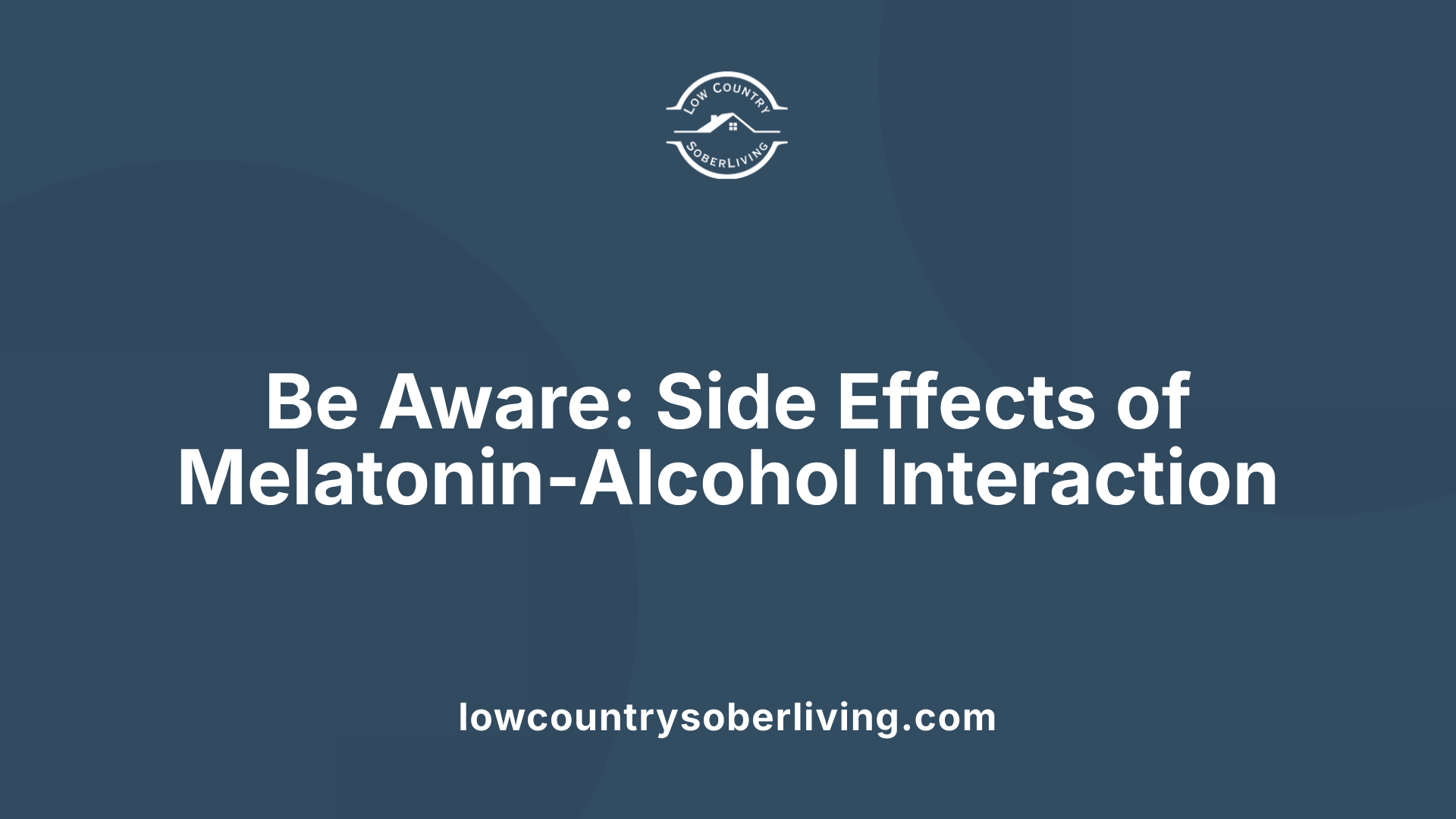
What are the side effects of taking melatonin after drinking alcohol?
Mixing melatonin supplements with alcohol can lead to a variety of unwanted effects. Both substances are sedatives, and their combined use can significantly enhance drowsiness, which increases the risk of accidents, injuries, and falls. People may experience excessive tiredness, grogginess, or difficulty waking up, especially after a night of drinking and taking melatonin.
In addition to sedation, this combination can impair cognitive function and coordination, making it harder to perform tasks that require alertness. Anxiety and increased heart rate are also common side effects reported. Some individuals might experience flushing, swelling in the feet or face, abnormal heartbeat, and feeling unusually cold or shivering.
More serious reactions, although rare, include dizziness, trouble focusing, and even hallucinations or passing out. Combining these substances disrupts sleep patterns further. Alcohol reduces melatonin production, which can worsen sleep disturbances like insomnia and obstructive sleep apnea. As a result, sleep quality may decline, with increased restless sleep and daytime tiredness.
Because of these risks, health professionals strongly advise avoiding alcohol after taking melatonin. This is especially important for individuals using time-release supplements or those with existing health issues like sleep disorders or respiratory conditions. Staying safe and ensuring better sleep quality means waiting at least 2-3 hours after drinking before taking melatonin, or better yet, avoiding alcohol altogether when supplementing for sleep.
Impact of Alcohol on Melatonin Supplements' Efficacy and Health
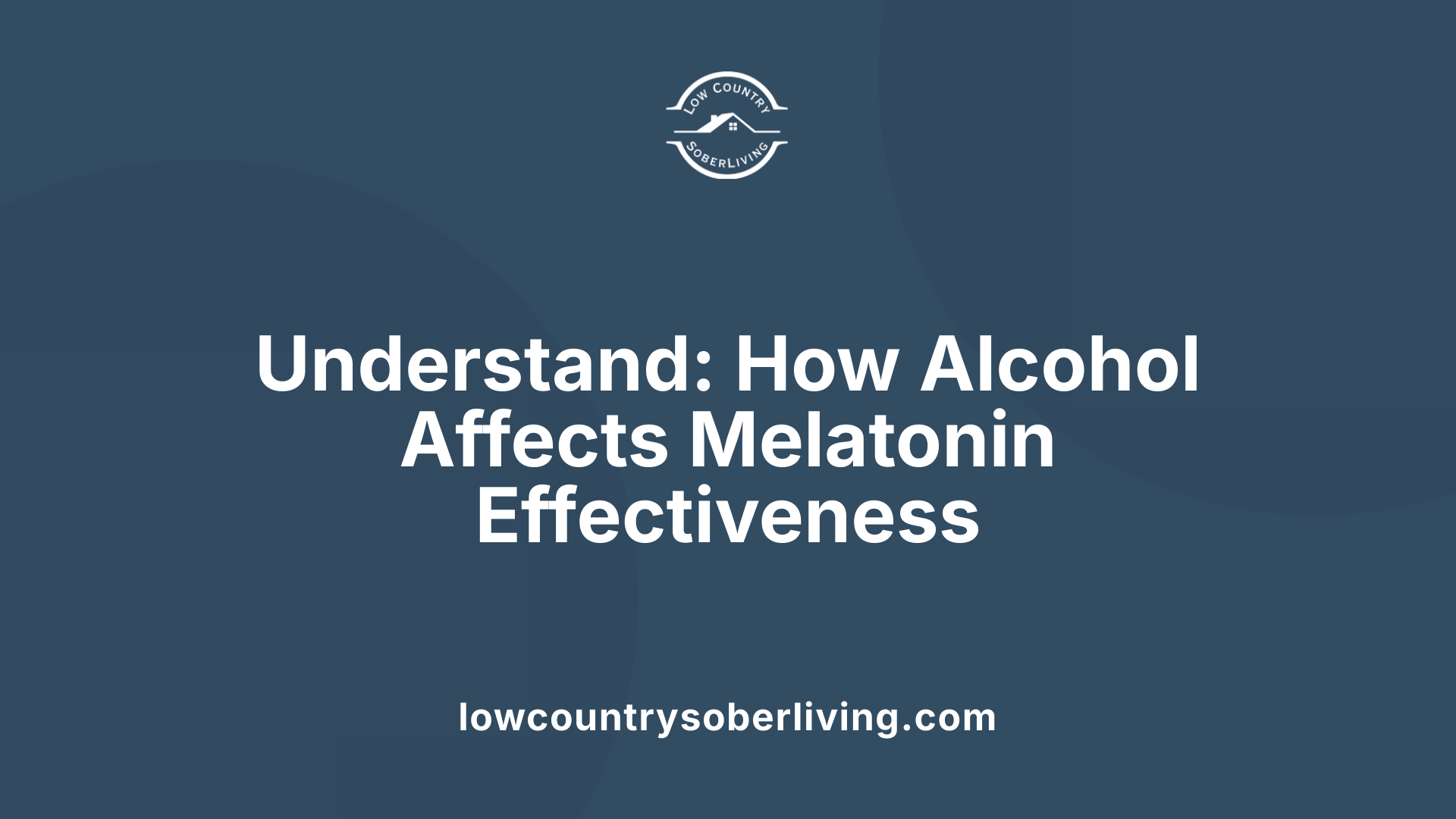
Does alcohol consumption decrease melatonin’s effectiveness in sleep regulation?
Alcohol consumption can significantly reduce the effectiveness of melatonin in regulating sleep. Research shows that alcohol not only decreases the body's natural melatonin production but also disrupts its circadian secretion patterns. Specifically, acute alcohol intake has been found to suppress salivary melatonin levels by about 15-19%, which can delay sleep onset and reduce sleep quality.
Moreover, alcohol tends to fragment sleep cycles, increasing wakefulness during the night and impairing REM and deep sleep stages. This disturbance counteracts the sleep-inducing benefits of melatonin supplements. Combining alcohol with melatonin can also lead to enhanced sedative effects, raising the risk of excessive drowsiness, dizziness, and anxiety.
Health professionals caution against mixing alcohol with melatonin, as this combination can cause serious health issues such as breathing difficulties, heart irregularities, and liver problems. Ultimately, alcohol not only hampers the natural production of melatonin but also diminishes its ability to improve sleep quality effectively.
Special Populations and Precautions
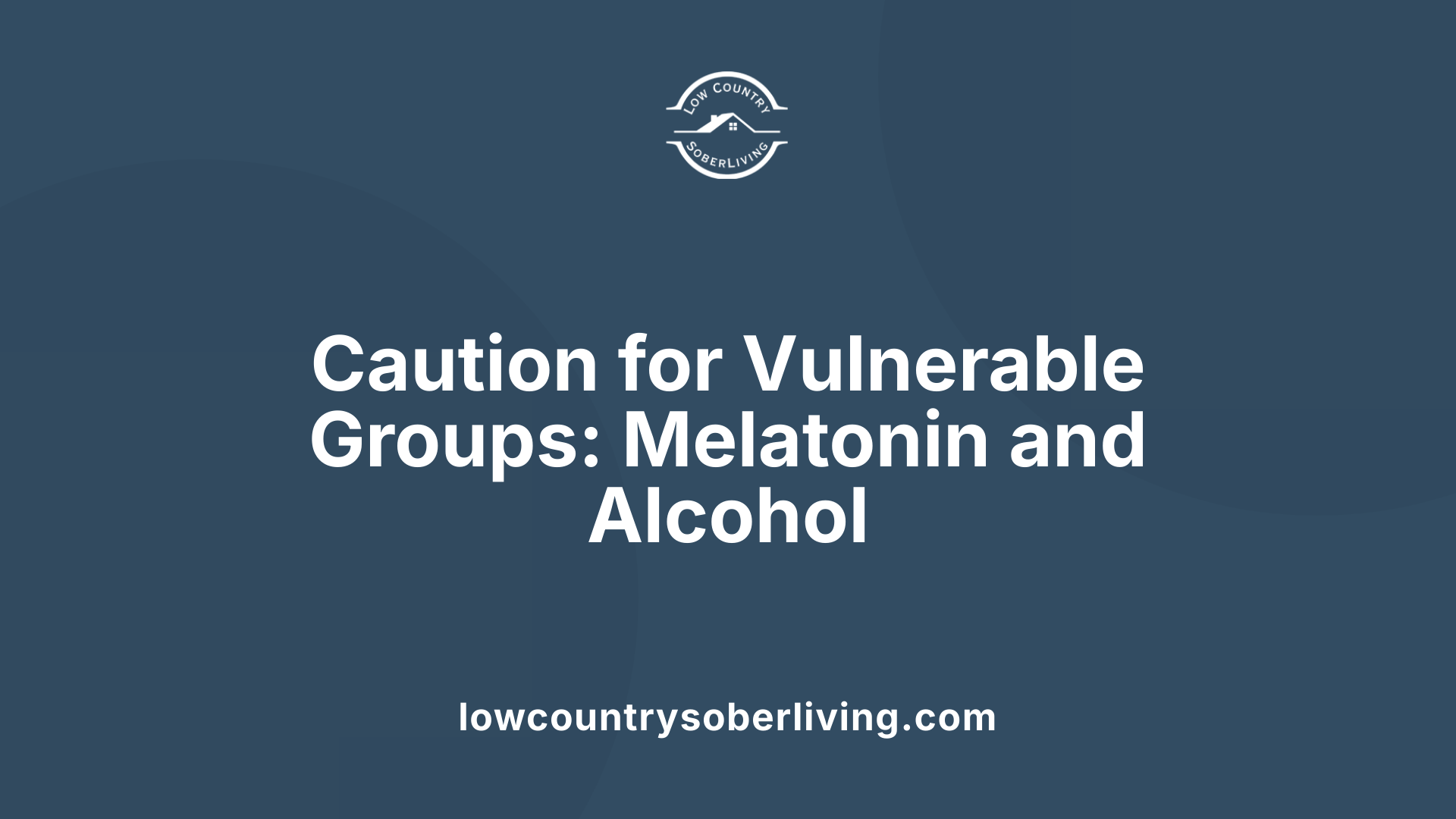
Vulnerable Groups
Certain populations, such as older adults over 65, individuals with underlying health conditions, or those taking medications like blood thinners or anxiety drugs, are at higher risk when mixing melatonin and alcohol. These groups may experience more severe side effects, including impaired coordination, increased fall risk, or exacerbated health issues.
Precautions for Certain Individuals
People with sleep disorders like sleep apnea should avoid alcohol altogether, as it can worsen breathing problems and interfere with sleep quality. Additionally, those experiencing side effects like dizziness, headaches, or unusual fatigue should consider avoiding alcohol during melatonin use.
Guidelines for Safe Use
Experts recommend waiting at least 2-3 hours after alcohol consumption before taking melatonin, depending on how much was consumed. It’s best to limit alcohol intake to one drink and avoid it within four hours of bedtime to reduce sleep disturbances.
Furthermore, combining melatonin with alcohol can lead to deep sedation and increased risk of accidents. Always consult healthcare professionals before combining these substances to ensure safety, especially for vulnerable groups. If accidental ingestion occurs with adverse symptoms, seek medical attention promptly.
Summary and Practical Advice
The interaction between melatonin and alcohol underscores the importance of understanding their combined effects on sleep and health. Alcohol impairs melatonin production, disrupts sleep cycles, and increases the risk of adverse reactions when taken together. For optimal sleep and safety, it is strongly recommended to avoid drinking alcohol while using melatonin supplements. Waiting a minimum of 2 to 3 hours after alcohol consumption before taking melatonin can mitigate some risks, but the safest approach remains abstinence or consulting healthcare professionals for personalized guidance. Being aware of these risks is essential for anyone seeking to improve sleep quality without compromising their health.
References
- Can You Mix Melatonin and Alcohol? - Healthline
- What Happens if You Take Melatonin With Alcohol?
- Is It Safe to Mix Alcohol and Melatonin?
- Alcohol and melatonin - PubMed
- Common questions about melatonin - NHS
- Mixing Melatonin and Alcohol | Addiction Treatment in FL
- Are melatonin and alcohol safe to mix? - Medical News Today

